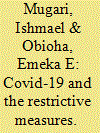|
|
|
Sort Order |
|
|
|
Items / Page
|
|
|
|
|
|
|
| Srl | Item |
| 1 |
ID:
182437


|
|
|
|
|
| Summary/Abstract |
The emergence of the COVID-19 pandemic at the onset of the year 2020 brought unprecedented suffering to humanity. Economic activities in virtually all nations across the globe were brought to a shuddering halt, with the third world suffering the worst effects on the economic front. The health security of nations across the globe was shaken, as nations came to terms with the surging health needs for the infected citizens. In order to grapple with the pandemic, nations took drastic measures, chief among them being the implementation of lockdowns, coupled with harsh restrictions. These measures, however, came at a cost. This paper explores the impacts of the restrictive measures that were implemented by the Zimbabwean government to combat COVID-19 pandemic. The paper interrogates these measures in the context of the national security discourse. In the analysis, the paper also makes reference to South Africa- a more developed nation and Zimbabwe’s neighbour.
|
|
|
|
|
|
|
|
|
|
|
|
|
|
|
|
| 2 |
ID:
189283


|
|
|
|
|
| Summary/Abstract |
The emergence of the COVID-19 pandemic brought about a myriad of responses on the global, regional and national levels. One of the widely adopted measures of dealing with the scourge was the crafting of stringent regulatory frameworks to curtail the spreading of the virus through restriction of citizens’ movement. The role of the police services and, importantly, the military, came under spotlight, as they were instrumental in enforcing COVID-19 containment-related laws. The confinement of people to their homes, as well as the enforcement of the restrictive regulations, led to a paradigm shift in the crime trends. More often, the police and the military had to contend with allegations of various criminal activities and human rights violations. In this paper, which was based on a documentary survey, we discuss the policing environment during the COVID-19 era. We focus on how the COVID-19 era has altered the criminal environment, focusing on criminal activities by both the public and the law enforcement agents. We also explore the human rights implications of the enforcement of COVID-19 containment regulations.
|
|
|
|
|
|
|
|
|
|
|
|
|
|
|
|
| 3 |
ID:
177868


|
|
|
|
|
| Summary/Abstract |
The advent of the social media in the past decade has revolutionised communication, overshadowing the traditional ways of communication. Despite its convenience, social media is being used as a conduit for criminal activities. Notwithstanding its dark side, social media has also been utilised in enhancing national security. This study explores the various ways in which social media has been used to enhance national security in Zimbabwe, as well as evaluating the ways of overcoming the social media threats to national security. A total of 274 respondents from members of the public and the security arms of the state were invited to participate in the study through questionnaires and in-depth interviews. In relation to national security, findings reveal that social media is mainly used by the government and its agencies as a platform for explaining key government programmes and safety issues to citizens, as an open source intelligence platform, and for disaster awareness and management. Regulation and monitoring of social media activities was viewed as the most effective measure against social media-induced threats, followed by temporary blocking of social media sites. Notwithstanding the perceived effectiveness of these measures, respondents raised concerns over the human rights implications of the measures.
|
|
|
|
|
|
|
|
|
|
|
|
|
|
|
|
|
|
|
|
|